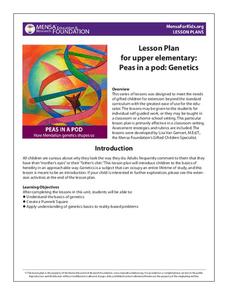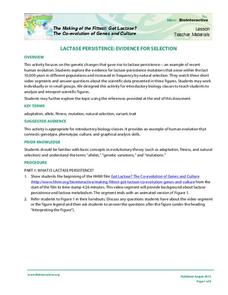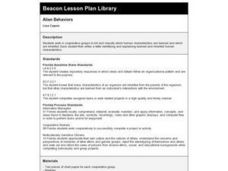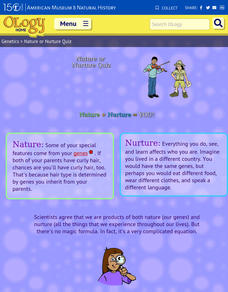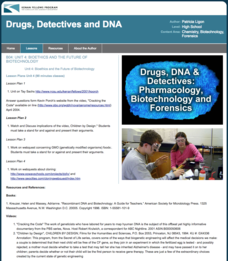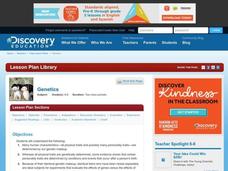Curated OER
Inherited Traits
Students work with a partner to complete an inventory of their traits and compare and discuss their unique qualities. In this biology lesson, students determine percentages for the frequency of observed traits of classmates, compile the...
Curated OER
Tracking Down Traits
Sixth graders list traits that all sixth graders share. They receive worksheets "Tracking Down Traits," working in groups to complete the chart. Students share results with the class and a class summary is tallied. Students discuss the...
Howard Hughes Medical Institute
Developing an Explanation for Mouse Fur Color
Whether or not you think mice are nice, you'll love the colorful activity! Scholars examine evidence for evolution in the rock pocket mouse through video, discussion, and collaborative work. Learners watch a video regarding variation in...
MENSA Education & Research Foundation
Peas in a Pod: Genetics
Can peas have grandparents? Learn about inherited traits and heredity with a set of activities focused on Mendelian genetics. As your class learns about the process of passing traits along in Punnett squares, they take on the role of...
Anthropological Association
Race: Teacher Guide: Race
How has the concept of race changed over time? Explore the genetic, cultural, and social aspects of race through a series of impactful activities. Scholars discover how race is influenced by inherited traits, examine census records to...
Howard Hughes Medical Institute
Understanding Variation
Does where we live influence how our bodies express genetic traits? Explore variation in human skin color with an activity that incorporate video and hands-on learning. Individuals model the relationship between phenotypes and genotypes,...
Howard Hughes Medical Institute
Zebrafish and Skin Color
You may not know if that zebrafish in your fish tank is a model citizen—but it is definitely a model organism! What can we learn about ourselves from a tiny zebrafish? Discover more about the polygenic trait of skin color through a...
Howard Hughes Medical Institute
Lactase Persistence: Evidence for Selection
What's the link between lactase persistence and dairy farming? Biology scholars analyze data to find evidence of the connection, then relate this to human adaptation. Working individually and in small groups, learners view short video...
Curated OER
Alien Behaviors
Second graders identify human characteristics and classify them as inherited traits or learned traits.
American Museum of Natural History
Nature or Nurture Quiz
Eighteen questions ask pupils whether certain behavior or trait is based on nature or nurture. Scholars take a quiz, reflect on their answers, then challenge a friend or family member to complete it.
Kenan Fellows
Unit 4: Bioethics and the Future of Biotechnology
What's the future of biotechnology? Explore a hot topic in the fourth and final unit in a series of Biotechnology lessons. Learners develop an understanding of the many issues in bioethics, then create an argument for or against the role...
Curated OER
Genetics
Comprehend that many human characteristics-all physical traits and possibly many personality traits-are determined by our genetic makeup. These activities demonstate that all physical traits are genetically determined, some evidence...
Chicago Botanic Garden
Migration, Adaptation, and Changing Climates
It is easy for humans to adapt to changing environments, but how do animals and plants do it? Classes discuss how plants and animals deal with environmental changes in the second of seven lessons. Through questions and discussions,...
Curated OER
Nature and Nurture
Students look into the role both nature and nurture play in determining an individual's traits. They examine how genes and the environment affect personality
Curated OER
The Illusion of Race
This is mostly an exploration of race through an interactive website, class readings, and discussion. Individuals take an online quiz about race, they answer questions on a worksheet by visiting another website, and discover that race is...
Curated OER
Gene Puzzles
Middle schoolers come to understand that in sexually reproducing organisms, such as humans, typically half of the genes come from each parent.
Students examine a fictional pedigree and determine which gene is responsible for a given...
Curated OER
Bringing the Rain to Kapiti Plain
Students identify the African Plains and the plants and animals that are found on the plain, which are of a benefit to humans. They listen to the story and actively participate in a choral reading of Bringing the Rain to Kapiti Plain.
National Center for Case Study Teaching in Science
In Sickness and in Health
Based on family history, how likely is it that a couple's children will have a recessive disease? In an in-depth, but easy-to-follow case study, future geneticists learn the story of Greg and Olga, who are hoping to have children, but...
Curated OER
Where are the Dinosaurs?
Students construct their own diorama based on the life of a dinosaur. In this dinosaur lesson, students create models of dinosaurs and dinosaurs' eggs to explore the life cycle of this extinct species.





